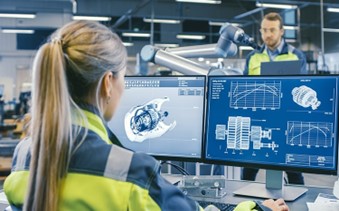Engineering interviews are like a bridge to your career goals. They offer the opportunity to showcase your skills, knowledge, and passion for your field. For mechanical engineers, interviews are a crucial step towards securing a dream job or advancing their careers. In this blog, we’ll be your guide through the world of interview questions and answers specifically tailored for mechanical engineering roles.
Preparing for Your Mechanical Engineering Interview
Before delving into the specifics of engineering interview questions and answers, let’s talk about the importance of preparation. Successful interviews start with thorough preparation. Here are some essential steps to get you started:
1. Research the Company and Job Role
When preparing for an engineering interview, one of the first steps you should take is researching the company and the specific job role you’re applying for. This knowledge will not only help you answer questions about why you want to work for the company but will also demonstrate your genuine interest and enthusiasm.
2. Review Your Resume and Work Experience
Expect interviewers to ask questions about your past experiences and qualifications. Be ready to discuss your resume in detail, highlighting your relevant skills and achievements. It’s crucial to match your experiences with the job requirements and responsibilities.
3. Understand the STAR (Situation, Task, Action, Result) Method
Many engineering interview questions, especially behavioral ones, can be effectively answered using the STAR method. This method involves describing a Situation or Task, the Actions you took, and the Results you achieved. It’s a structured way to present your experiences and showcase your problem-solving and leadership skills.
Most Common Interview Questions for Mechanical Engineers
Now, let’s dive into the most common engineering interview questions you’re likely to encounter in your mechanical engineering job interviews and provide you with sample answers and tips to help you respond confidently.
1. Tell me about yourself.
This is often the first engineering interview question in an interview and is an opportunity to make a positive first impression. Keep your response concise, focusing on your professional background, relevant experiences, and why you’re interested in the role.
2. Why do you want to work here?
Employers want to know why you’re interested in their company. Be specific about what attracts you to the organization and how your relevant skills e.g., designing energy-efficient systems align with their goals.
3. What are your strengths and weaknesses?
When discussing your strengths, focus on qualities relevant to the job, such as problem-solving, attention to detail, or teamwork. When addressing weaknesses, be honest but show that you are actively working to improve them.
4. Describe a challenging project you worked on.
Interviewers often ask this question to gauge your problem-solving abilities and how you handle challenging situations. Use the STAR method to structure your response.
Sample Answer: “In my previous role at [Previous Company], I was tasked with improving the efficiency of our manufacturing process. The situation was challenging because we were dealing with outdated equipment and tight production schedules. I took the initiative to lead a cross-functional team, identifying bottlenecks in the process (Situation). We implemented new automation technology and streamlined workflows (Action), which resulted in a 20% increase in production efficiency and a significant cost savings (Result).”
5. How do you handle tight deadlines or pressure?
In the field of mechanical engineering, the ability to work under pressure is crucial. Showcase your composure and problem-solving skills such as careful planning, stay focused, prioritizing tasks, setting milestones in your response.
6. What software/tools are you proficient in?
Mechanical engineers often use specialized software and tools including AutoCAD, SolidWorks, and ANSYS for design and simulation. Be sure to mention the ones you are proficient in, and provide examples of how you’ve used them in your work.
7. Explain your approach to problem-solving.
Mechanical engineers are problem solvers by nature. Highlight your analytical skills and systematic approach to tackling complex challenges.
Possible answer of this engineering interview question is my approach to problem-solving involves a systematic process. First, I gather all relevant data and information to fully understand the issue at hand. Then, I break the problem down into manageable parts and identify potential solutions. I prioritize these solutions based on their feasibility and potential impact. Next, I implement the chosen solution, closely monitor progress, and make adjustments as needed. Finally, I evaluate the results to ensure the problem is resolved effectively. This approach has helped me successfully tackle numerous engineering challenges throughout my career.
8. How do you stay updated with industry trends?
Employers want to know that you are committed to ongoing learning and staying up-to-date with the latest developments in your field. To stay updated, regularly read industry publications, participate in webinars, and attend conferences and workshops. mention any relevant professional organizations, which provides valuable networking opportunities and access to the latest research and advancements in mechanical engineering.
9. Discuss a situation where you worked in a team.
Teamwork is crucial in engineering projects. Share an example that demonstrates your ability to collaborate effectively with colleagues We faced various challenges, including tight deadlines and conflicting ideas within the team. To overcome these challenges, I took on the role of team leader, facilitating open communication and ensuring that everyone’s ideas were heard and considered.
10. Where do you see yourself in five years?
Employers want to know about your long-term goals and whether you are a good fit for their organization’s growth plans.
Sample Answers and Tips
In the previous section, we provided sample answers for some of the most common interview questions for mechanical engineers. However, it’s essential to tailor your responses to your unique experiences and the specific job you’re interviewing for. Here are some additional tips to keep in mind:
Be Concise: Keep your answers focused and concise. Interviewers appreciate candidates who can communicate effectively.
Showcase Your Achievements: Use concrete examples and metrics to demonstrate your accomplishments and the impact of your work.
Practice: Practice your answers with a friend or mentor to gain confidence and receive feedback.
Ask for Clarifications: If you don’t understand a question, don’t hesitate to ask the interviewer to clarify. It’s better to provide a well-thought-out response than to rush into an answer.
Be Honest: Be truthful in your responses. If you don’t know the answer to a technical question, admit it and express your willingness to learn.
Behavioral Interview Questions

In addition to the common engineering interview questions discussed above, you may encounter behavioral interview questions. These questions assess how you’ve handled situations in the past, as they believe past behavior is a good indicator of future performance.
Here are some examples of behavioral engineering interview questions and how to answer them:
1. Tell me about a time when you had to deal with a difficult team member.
Sample Answer: In a previous project, I worked with a team member who had a different approach to problem-solving. This led to conflicts and slowed down our progress. To address this issue, I initiated a one-on-one discussion with the team member to understand their perspective better. I actively listened to their concerns and suggestions and found common ground. We agreed on a compromise that allowed us to work together more effectively and complete the project successfully.
2. Describe a situation where you had to meet a tight deadline.
Sample Answer: In my previous role, we had a project with an unexpectedly tight deadline due to a client’s urgent request. To meet the deadline, I organized a cross-functional team and set clear priorities. We worked extra hours, and I personally ensured that communication flowed smoothly among team members. By staying focused and adjusting our workflow, we not only met the deadline but also exceeded the client’s expectations.
Technical Questions


In addition to behavioral engineering interview questions, you can expect technical questions specific to mechanical engineering. These questions assess your technical knowledge and problem-solving skills. Here are some examples and tips on how to approach them:
1. Can you explain the difference between stress and strain in materials?
Stress is the internal resistance of a material to deformation when subjected to an external load. It’s measured in force per unit area (e.g., N/m² or Pascals). On the other hand, strain is the ratio of the change in size or shape of a material to its original size or shape. It’s typically expressed as a dimensionless quantity and can be thought of as a measure of deformation.
2. How would you approach the design of a heat exchanger for a specific application?
The design of a heat exchanger depends on various factors, including the type of fluids involved, the desired temperature change, and the available space. I would start by conducting a heat transfer analysis to calculate the heat transfer rate required. Then, I would consider the design parameters such as the type of heat exchanger (e.g., shell-and-tube, plate), the flow rates of the fluids, and the materials to be used. Additionally, I would evaluate factors like fouling resistance and pressure drop to optimize the design for efficiency and cost-effectiveness.
3. What is the role of a flywheel in an engine?
A flywheel stores energy and smoothens out the engine’s power output, reducing fluctuations and maintaining steady rotation.
4. Define the term ‘stress concentration’
Stress concentration happens when stress levels in a material significantly rise at specific locations due to geometric irregularities or structural defects. This localized increase in stress can lead to weaknesses and potential failure points in the material.
5. What is the difference between ductile and brittle materials?
Ductile materials can deform significantly before breaking, while brittle materials break with little or no plastic deformation.
6. What is the difference between static and dynamic balance in rotating machinery?
Static balance refers to the equilibrium of an object when it’s not in motion, ensuring that its center of mass aligns with its axis. In contrast, dynamic balance focuses on maintaining equilibrium during rotation, accounting for variations in weight distribution as the object moves. Both types of balance are crucial in mechanical engineering to prevent vibrations and ensure the safe and efficient operation of rotating machinery.
Questions to Ask the Interviewer
Towards the end of your interview, you’ll likely have the opportunity to ask the interviewer questions. This is a crucial moment to demonstrate your interest in the position and the company. Here are some questions you can consider asking:
“Can you tell me more about the team I’ll be working with?”
“What are the most significant projects or challenges the team is currently facing?”
“How does this role contribute to the company’s overall goals and mission?”
“What opportunities for professional development and growth are available in this position?”
“What is the company’s approach to innovation and staying at the forefront of the industry?”
Conclusion
In conclusion, successful performance in a mechanical engineering job interview needs meticulous planning, confidence, and the capacity to effectively communicate your talents and experiences. To increase your chances of success, practice responses to frequent technical and behavioral interview questions.
Remember that interviews are an opportunity for you to determine whether the firm corresponds with your values and professional aspirations as well as for companies to assess your qualifications. You’ll have a better chance of getting the mechanical engineering job you want if you approach interviews positively and professionally. Stay upbeat and assured; you can succeed in every interview and develop your mechanical engineering career with the appropriate preparation and mindset. I wish you luck!


